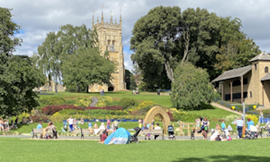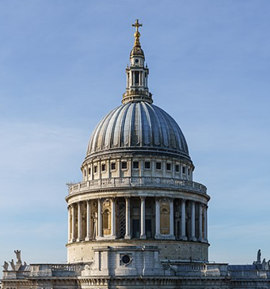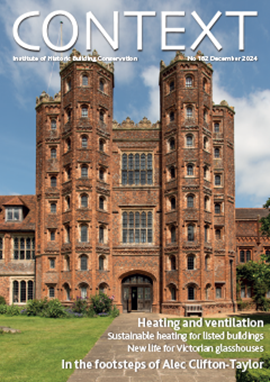Rose window
 The rose window at St Mary's Church, Cheltenham is from the 14th century. It is presumed to commemorate the martyrdom of St Catherine of Alexandria, put to death on a wheel. This Grade I listed church is in a quiet section of Cheltenham's commercial heart; parts of the building date to the late 12th century. The rose window at St Mary's Church, Cheltenham is from the 14th century. It is presumed to commemorate the martyrdom of St Catherine of Alexandria, put to death on a wheel. This Grade I listed church is in a quiet section of Cheltenham's commercial heart; parts of the building date to the late 12th century.
|
Gardner’s Art Through the Ages (eighth edition) was published in 1986. It was published by Harcourt Brace Jovanovich and written by Horst de la Croix and Richard G. Tansey.
It defines a rose window (or a wheel window) as: 'The large, circular window with tracery and stained glass frequently used in the facades of Gothic churches.'
In Gothic churches and cathedrals, the decorations in the rose window served as illustrations to educate 'illiterate' members of the congregation. They would often be adorned with Biblical stories or symbols intended to instruct people how to worship and behave.
Rose windows were sometimes used during the Romanesque period, but these windows were usually plain. It was not until the 12th century that complex stained glass and tracery decorations began to appear in rose windows.
In many churches, the rose window is located at the west end of the nave, in the end of the transepts.
Rose window is sometimes used as a generic term for a circular window.
[edit] Related articles on Designing Buildings Wiki
IHBC NewsBlog
SAVE celebrates 50 years of campaigning 1975-2025
SAVE Britain’s Heritage has announced events across the country to celebrate bringing new life to remarkable buildings.
IHBC Annual School 2025 - Shrewsbury 12-14 June
Themed Heritage in Context – Value: Plan: Change, join in-person or online.
200th Anniversary Celebration of the Modern Railway Planned
The Stockton & Darlington Railway opened on September 27, 1825.
Competence Framework Launched for Sustainability in the Built Environment
The Construction Industry Council (CIC) and the Edge have jointly published the framework.
Historic England Launches Wellbeing Strategy for Heritage
Whether through visiting, volunteering, learning or creative practice, engaging with heritage can strengthen confidence, resilience, hope and social connections.
National Trust for Canada’s Review of 2024
Great Saves & Worst Losses Highlighted
IHBC's SelfStarter Website Undergoes Refresh
New updates and resources for emerging conservation professionals.
‘Behind the Scenes’ podcast on St. Pauls Cathedral Published
Experience the inside track on one of the world’s best known places of worship and visitor attractions.
National Audit Office (NAO) says Government building maintenance backlog is at least £49 billion
The public spending watchdog will need to consider the best way to manage its assets to bring property condition to a satisfactory level.
IHBC Publishes C182 focused on Heating and Ventilation
The latest issue of Context explores sustainable heating for listed buildings and more.















